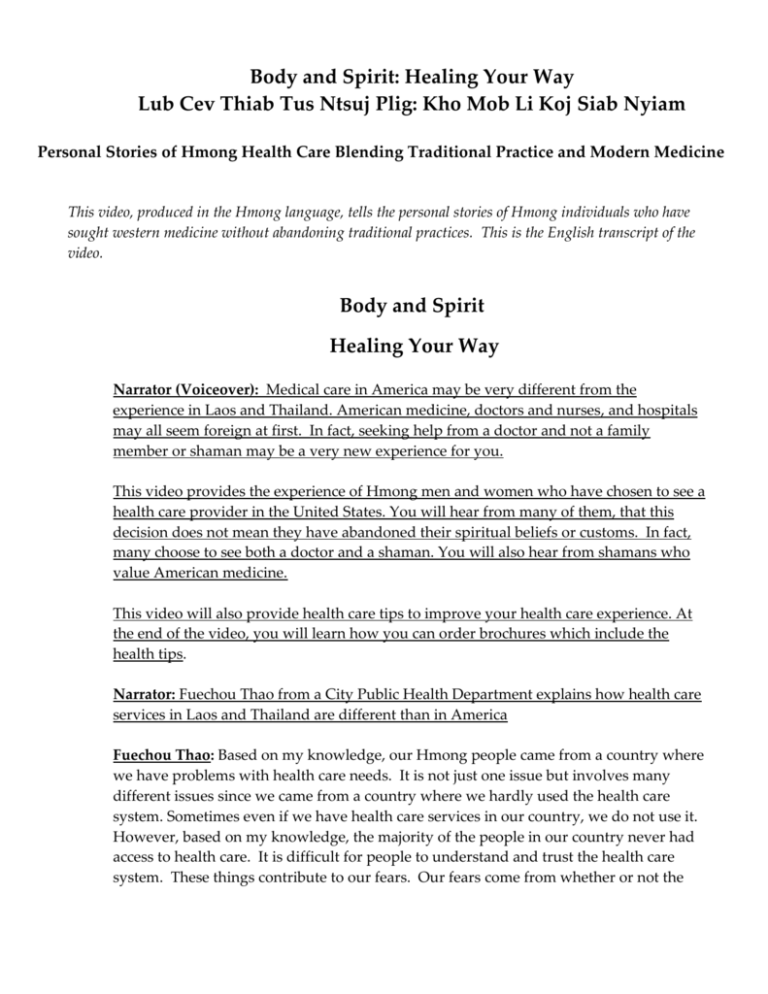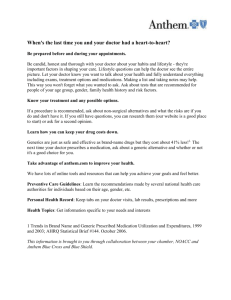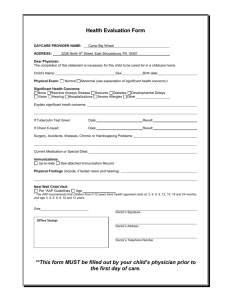
Body and Spirit: Healing Your Way
Lub Cev Thiab Tus Ntsuj Plig: Kho Mob Li Koj Siab Nyiam
Personal Stories of Hmong Health Care Blending Traditional Practice and Modern Medicine
This video, produced in the Hmong language, tells the personal stories of Hmong individuals who have
sought western medicine without abandoning traditional practices. This is the English transcript of the
video.
Body and Spirit
Healing Your Way
Narrator (Voiceover): Medical care in America may be very different from the
experience in Laos and Thailand. American medicine, doctors and nurses, and hospitals
may all seem foreign at first. In fact, seeking help from a doctor and not a family
member or shaman may be a very new experience for you.
This video provides the experience of Hmong men and women who have chosen to see a
health care provider in the United States. You will hear from many of them, that this
decision does not mean they have abandoned their spiritual beliefs or customs. In fact,
many choose to see both a doctor and a shaman. You will also hear from shamans who
value American medicine.
This video will also provide health care tips to improve your health care experience. At
the end of the video, you will learn how you can order brochures which include the
health tips.
Narrator: Fuechou Thao from a City Public Health Department explains how health care
services in Laos and Thailand are different than in America
Fuechou Thao: Based on my knowledge, our Hmong people came from a country where
we have problems with health care needs. It is not just one issue but involves many
different issues since we came from a country where we hardly used the health care
system. Sometimes even if we have health care services in our country, we do not use it.
However, based on my knowledge, the majority of the people in our country never had
access to health care. It is difficult for people to understand and trust the health care
system. These things contribute to our fears. Our fears come from whether or not the
Body and Spirit: Healing Your Way
English Transcript
doctor is accurate in diagnosing our illness. These things are a problem for us and the
doctors in this country.
Narrator: Nhia Ying Yang, a 40 year old shaman, encourages the Hmong to see a doctor
and to ask for an interpreter if they need one.
Nhia Ying Yang: We know that seeing a doctor is how we can get prescription medicine
to help us. If we hesitate to go, we cannot fight our illness and will not get better. That is
why we must go. We do not worry about anything, even if language is a barrier. We
will find an interpreter so we can understand what the prescription medicines are for.
Nhia Ge Lor: No, I am not anxious because I can trust doctors.
Narrator: Where should you go when you need help? Xay Thor, a 47 year old Shaman,
suggests that a doctor addresses a physical ailment and a shaman addresses a spiritual
ailment, and which you seek is a personal decision
Xay Thor: It is up to the person. I tell you whether that person has spirit or not. If that
person loses their spirit then yes, a call for spiritual healer is necessary. If it is an ailment
from the physical body, then it’s best if a doctor prescribe some medicine to help fight
the illness.
If doctors are not able then it is up to spiritual healing and vise versa. That is the only
way to go. Both methods complement each other.
Song Cheng: The doctor can help diagnose an illness as a shaman can help heal the
spirit so yes the two can work with one another.
Nhia Ying Yang: Lots of people told me that “I have gone to see the doctor but the
doctor did not see anything wrong with me, so I have come to consult with you, Nhia
Ying.” Many people have said that to me so I helped them. Because they see that the
doctor could not find what was wrong with them, so they believe that it must be a
spiritual cause.
If I cannot help them, I would tell them that, “Perhaps your ailment is not due to
spiritual cause but a disease so you have to go see a doctor.”
Copyright 2007
All Rights Reserved
Page 2 of 8
Body and Spirit: Healing Your Way
English Transcript
Fuechou Thao: It is my belief that even if you go seek traditional healers or shamans, the
best way is to use our traditional methods and seek Western medicine as well.
Narrator: Bee Vang, prefers seeing a doctor before considering spiritual help
Bee Vang: Living here in the States, I know that there are doctors. I would prefer to go
see them first before I seek a shaman.
Song Cheng: Yes, I think it is great because without going to the doctor, I would not be
well.
Nhia Chou Yang: Seeing a doctor is good. I often go see my doctor by South Park St. In
2004, I went to see my doctor about my heart because I was having hard time breathing.
The doctor asked me to cut back on certain foods so that my arteries do not clog. Now I
am only drinking tea but I am not to smoke or drink.
Nhia Lee: Since my English is not very good, they always find an interpreter for me in
case the doctor wants to perform complicated procedures or discuss my medical issues.
Considering American medical treatment does not mean giving up your traditions.
Narrator: Choosing to see an American doctor does not mean giving up your personal
spiritual beliefs or cultural practices.
Nhia Chou Yang: I still practice our traditional healing methods, and we as veterans in
particular have always believed in original Hmong traditions from our country.
Song Cheng: If your spirit is attached to your body, everything will work out including
the doctor’s prescription. If it is not, then every method will fail and death is inevitable.
Nhia Ying Yang: Our Hmong people have known this idea from our ancestors many
generations ago since the dawn of time.
Narrator: The doctor or nurse can work with you to incorporate your beliefs into any
treatment plan. In order to do this the doctor or nurse will need to know what
treatments you will consider and if you do not wish to take certain medications.
Fuechou Thao: One of the most important things is that if you are using both methods,
you must inform your health care provider if it is all right that you are using both herbal
Copyright 2007
All Rights Reserved
Page 3 of 8
Body and Spirit: Healing Your Way
English Transcript
medicine and prescriptions. It is extremely important not to hold this information back
from your health care provider so they are informed. This is so the health care provider
knows that you are using their treatment as well as other complementary medicines. In
case there is a serious drug interaction, they will be able to help.
[ HEALTH TIPS Intermission 1]
Narrator: If you choose to go to an American doctor or nurse these tips may help
improve your health care experience.
Before you go to the doctor or nurse……
Ask for an interpreter when you make your appointment.
Write out your questions. Take them with you.
Ask someone to come with you.
Plan to arrive early to your appointment.
Bay Her Yang: Since I am old, if I am sick, I go to see the doctor. They will prescribe
medication for me. If I am not well after that, I will come back and pray. I am not scared
of examinations when I go in for doctor’s appointments. I am not scared of going to the
doctor for an overall physical checkup including mammogram. Since I have been in
America, I have not viewed going to the doctor as a negative experience. It is only good.
Fuechou Thao: Some illnesses are contagious, spread from one person to others. Some
illnesses come from within the body of a person. Some illnesses are a result of stress and
depression or other mental health issues. These kinds of things are a problem for us all.
Narrator: Manivan Vang, a 35 year old public health nurse, believes that Hmong
individuals avoid routine check-ups out of fear, but that it is necessary in order to
diagnose illness which has no symptoms.
Manivan Vang: I think that they are scared so they think if they don’t have any illnesses
then they will not go. As far as routine check ups, the Hmong tend not to go and only go
when they are really sick. Then they will go and by that time it might be already too late
for an illness such as cancer. It might be too late to detect the spread of it if you wait too
long.
Bee Vang: To stay healthy, you have to get medical checkups first.
Copyright 2007
All Rights Reserved
Page 4 of 8
Body and Spirit: Healing Your Way
English Transcript
Xay Thor: It is a good idea. I do go often as well to do check ups because if you wait
until you are really ill then it might be already too late. So when you go for check ups,
then they are able to detect ahead of time. Even as a shaman, I still see a doctor once or
twice a month. If you are sick, they can detect the illness.
I go to maintain my health because I really do not know what it is that may or could be
wrong. The doctor might see something you might be able to pick up. If I do not go visit
them, maybe it could also be something else. Whether I am ill or not I still go. Though I
am a shaman, I have a poor appetite and chronic upset stomach. I wondered what was
wrong. If I didn’t go, it may be something else more serious. So I went, but they said it
was nothing. I believe maybe it was because my shaman spirits conflicted with the food
I consumed.
[HEALTH TIPS Intermission 2]
Narrator: To get the most out of your health care visit, ask questions of your doctor and
take notes.
At the clinic, ask your doctor to…
Explain your diagnosis or treatment.
Explain your options and possible side effects.
Use common names of medicines.
Write down what you have agreed to do. (Your “treatment plan”).
Write down the name and phone number of who to call with questions or
problems between visits.
Narrator: Your lifestyle choices can help prevent disease.
Nhia Ge Lor: To stay healthy is especially difficult in the winter. But in the summer, we,
the older generation, like to enjoy the weather. We go places and do not like to stay
home. We like to exercise in order to maintain our health.
In today’s world, we often eat unhealthy foods here in the United States. We like sweets
and soda such as Pepsi. Many of us suffer from diabetes. It is not like back in the old
country where we ate a variety of vegetables. We, the older generation, like to eat plain
Copyright 2007
All Rights Reserved
Page 5 of 8
Body and Spirit: Healing Your Way
English Transcript
vegetables, beans, and things like that. We do not eat only meat. We must avoid a lot of
meats and fats. If you do not exercise and do not sweat, you get sick.
Xay Thor: First, eat healthy food. Do not eat junk food. Follow good habits and make
wise choices.
Song Cheng: Cook your own food. I cannot eat American food. I prefer to eat Hmong
traditional meals to stay healthy.
Nhia Chou Yang: Yes, I take a walk around the lakes once a day. I believe if you eat
fatty foods, you will not be healthy.
Manivan Vang: It is important to stay healthy. You have to take care of yourself, eat
healthy food, and exercise. Back in the old days, the Hmong people farmed and walked
a lot and that was like exercising. However, in the U.S., we are too relaxed and
comfortable so we do not go out a lot to exercise or garden.
[End Credits]
The Health Care Tips you have seen in this video are available in a bilingual (English
and Hmong) brochure. To order one or more brochures or additional copies of this
video contact:
The Center for Patient Partnerships
975 Bascom Mall, Suite 4311
Madison, WI 53706
608-265-6267 (Phone)
_________
If you have questions or need advocacy call one of the following organizations:
Freedom, Inc. (608) 661-4089 / 24 Hour Hotline (888) 345-5898 (Hmong/English)
United Asian Services of Wisconsin (608)-256-6400 or (888)-404-8779
(Hmong/English)
American Cancer Society 1-800-227-2345 (Press 1 and ask for a translator)
Madison Department of Public Health – East Washington Office (608) 246-4516
Center for Patient Partnerships (English only) (608) 265-6267
Copyright 2007
All Rights Reserved
Page 6 of 8
Body and Spirit: Healing Your Way
English Transcript
This video is a joint project of the Center for Patient Partnerships and Freedom Inc.,
generously funded by the Evjue Foundation and the American Cancer Society.
Produced through the facilities of the Instructional Media Development Center
(IMDC), School of Education, University of Wisconsin-Madison
-----Project Director: Meg Gaines
Project Manager: Sarah Davis
Video Production Director: Clark Thompson
Production Manager: Catherine Odette
Project Members and Videographers: Catherine Odette, Xue Yang,
Hue Yang, Amy Wencel
Freedom Inc. Hmong Resource Center Partner: Kabzuag Vaj and Mee Vang
Content: Sara Karon & Meg Wise
Consultants: Melissa Stewart & Mary Michaud
Translator: Yer Yang
Narrators: Lee Yang, Panhia Yang
Original Music: Hue Yang, Xue Yang
Administrative Specialists: Kristof M. Stremikis, Jennifer Weber & Jennie Falligant
----Special Thanks to:
Fuechou Thao, Madison Department of Public Health
Manivan Vang, Madison Department of Public Health
WORT Radio Station
Sao Lor Family Child Care
James Arroy, Bull Fight Graphic Design
Paul Ly Tong-Pao, Bayview Foundation Inc.
Peng Her, Taste of Asia Restaurant
Dr. Kathy Oriel, Northeast Family Medical Center &
University of Wisconsin School of Medicine
__________
Copyright 2007
All Rights Reserved
Page 7 of 8
Body and Spirit: Healing Your Way
English Transcript
Thanks also to our interviewees:
HMONG
Fwm Tsu THOJ
Manivan VAJ
Npaim Hawj YAJ
Ntxhais THOJ
Bis VAJ
Nyiaj Zeb LAUJ
Ntxhoo TSHEEJ
Nyiaj LEE
Nyiaj Yeeb YAJ
Nyiaj Tsu YAJ
ENGLISH
Fuechou THAO
Manivan VANG
Bay Her YANG
Xay THOR
Bee VANG
Nhia Ge LOR
Song CHENG
Nhia LEE
Nhia Ying YANG
Nhia Chou YANG
Thanks also to the clinic participants:
Dr. Kathy Oriel
Debra Powers
Zar Thao
Brenda Wassertheurer
Xue Yang
Copyright 2007
All Rights Reserved
Page 8 of 8







